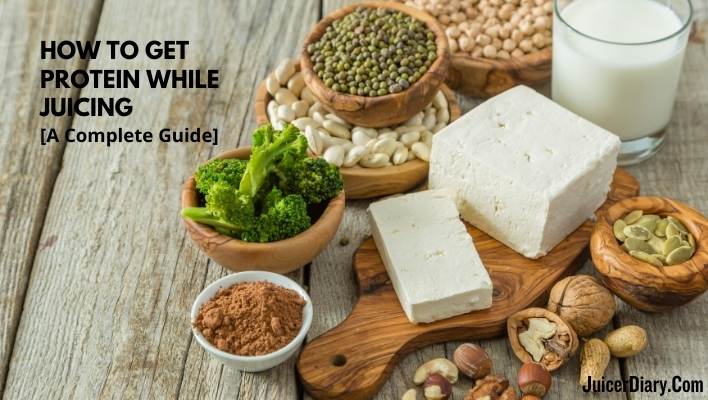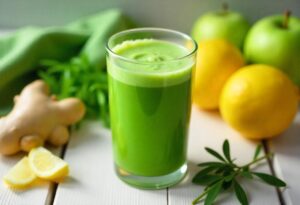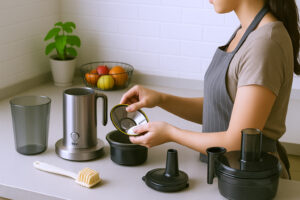As soon as we think of starting a juice fast for body detox a lot of questions come to our mind, how do I get my daily dose of protein while juicing? How much should I drink so that I don’t lose a significant body weight, fast? Is there any quick recipe for protein juice?
We will try to answer all these questions today. But before we move on to that let’s start with some basic questions first.
Why Do We Need Protein?
Protein is the most fundamental nutrient that every human needs. It is called ‘The Building Block of Life’ because it forms the foundation of every cell in our body.
Our skin, organs, and glands contain protein so much so that a small deficiency can lead to serious problems. Weakening bones, impaired immune system (therefore increasing the risk of infections), loss of energy levels, loss of muscle mass, growth restriction in children and teens are some of the prominent examples. Lack of proteins can cause hair loss and skin problems too.
Furthermore, the amino acids in protein help repair cells and create new ones during illness for recovery. So the importance of protein in our lives cannot be ignored. Even if we are on a juice fast, we must ensure we are getting our required daily dose of protein.
How Much Protein Is Adequate?
How much protein a person should get out of his/her daily foods, or homemade juice remains a controversial question. According to some research journals, a person’s protein requirements should be determined by his or her body weight.
The Food and Nutrition Board of the US National Research Council has established a parameter called RDA (Recommended Dietary Allowance). According to them the RDA of protein of a healthy adult is 0.8g per kg as per his or her total body weight.
But what would happen if someone tries to reduce weight? This obviously needed more research. And that’s how the next theory based on an adult’s daily calorie intake was invented.
According to Mayo Clinic, protein should account for 10% to 35% of a healthy adult’s calorie intake. If you are on a 2000 calorie diet, you should consume 100 grams of protein per day. This will ensure a 20% supply of calories from protein sources (1g protein equals 4 calories).
If you are using store-bought juices, check the nutritional information on their label. For homemade juice, a nutritional chart should be used.
Having said that, a person’s protein requirement is also influenced by his or her age, sex, and health status. So it’s always a good idea to consult a doctor, especially if you are unsure about your specific condition.
How to Get Protein While Juicing?
Well, there are many ways that we can incorporate protein into our juice. But we will stick to the three most common ways here so that it is easier for everyone to adopt.
a) Fruits and Vegetable Sources
People tend to depend a lot on animal based products to meet their daily protein needs. Do you know that plant based sources can fill the gap too?
Of course, vitamins and minerals are the first things that come to mind when we think of fruits and veggies, but they can be a great source of protein as well. Here are some fruits and vegetables that can pack an extra punch when it comes to protein.
Vegetables:
- Green Peas = 8g of protein per cup (145g)
- Yellow Corn = 5g of protein per cup
- Spinach= 5g of protein per cup
- Broccoli = 4g of protein per cup
- Artichoke = 4.2g of protein per cup
Fruits:
- Goji berries = 11g of protein per 100g
- Guava = 4 grams of protein per cup
- Avocados = 3 grams of protein per cup
- Collard greens = 3g of protein per 100g
- Jackfruit = 2.8 grams of protein per cup
- Apricot = 2.3 grams of protein per cup
- Kiwi = 2 grams of protein per cup
b) Whole Food Sources
Mixing whole food sources like chia seeds, hemp seeds, or spirulina with juices can give you a quick protein boost. These additions can also provide your juice a different taste, sometimes in your favor, sometimes not.
Chia Seeds – 1 oz (28.3 g) provides approximately 4 grams of protein
If you’re new to juice fasting and frequently feel tired or hungry, try soaking chia seeds in your juice. In half an hour, they will swell into the liquid. Because chia seeds are high in fiber, they will add gelatinous texture to the juice, making it more filling for you.
Ground Flax Seeds – 1 oz contains around 5 grams of protein
Unless you have hormone related issues, flax seeds can be a great addition. Whole flax seeds can be hard on your stomach, so consider only the ground seed options. Ground flaxseeds also add a gritter texture to your juice.
Hemp Seeds – 1 oz will add about 10 grams of protein
Combining hemp seeds with fruit or vegetable juice is another way you can boost its protein content. They will give the juice a nutty flavor with gritty textures.
Spirulina – 1 oz contain 16 grams of protein
If you don’t mind the strong flavor of freshwater algae, Spirulina can be another decent protein source. One tablespoon is enough at the beginning. This amount of blue-green algae will add approximately 4g of protein to your juice.
c) Adding Protein Powder
There is no denying that things like kale and spinach, spirulina, or chia seeds have a good amount of protein in them. However, there are times when you’ll have to consider adding a bit more protein to your juicing.
For example, when you work out you’ll need plenty of protein and think beyond just plant based sources. A 16-ounce glass of green juice can only provide the same amount of protein you’ll get from a single chicken nugget (3g). If you want to grow muscle, that isn’t going to be very effective. And that’s when supplementing your juice with powdered form of protein becomes necessary.
Protein powders help you get more protein into your diet without having to spend hours preparing meals. They also allow you to control how much protein goes into each serving.
Protein powders are available at most grocery stores as well as health food stores. They come in many different forms. Some are made from organic sources like rice and peas. They help you to meet your protein needs, at the same time keep you away from whey based options.
Pure Food: Plant-Based Protein Powder is a decent vegan protein powder that you can add to your next shopping list. It doesn’t contain any artificial flavors, excess sweeteners or preservatives, and still goes alongside the natural process of juicing quite well.
Consumers also love the probiotics it contains, it keeps your gut nice and healthy. Your gut will undergo significant changes when you try to adopt a protein juice cleanse. So this is definitely an important factor you should watch out for. What more could you want from the best protein powder for juicing?
How Much Should I Drink Each Day?
It depends on how active you are. The general recommendation is 8 ounces every two hours during exercise sessions and 4–6 ounces before bedtime. This will ensure that you stay hydrated throughout the day. However, this amount may vary depending on whether you work out indoors or outdoors, as well as other factors such as climate conditions.
A Simple 17g Protein Juice Recipe
Take a full glass of fresh juice and add one cup of green peas and one cup of corn kernels. Double the amount of kale and add a few slices of pineapple. Avoid pineapple if you have acidity issues. Use a half slice apple instead. Use a well rounded juicer machine for the finest result.
Benefits Of Juicing with Protein
Our bodies tend to digest protein slower than carbs, so adding them to your juice fast will keep you feeling full for longer and full of energy throughout the day. This in turn helps you prevent food cravings and stick to your diet plan. Moreover, when you drink them as juices, they’re much easier to absorb by the body compared with eating them as solid foods.
If you’ve never tried drinking raw fruits, vegetables, or plant seeds before then this may seem daunting at first but once you get used to it, you’ll find yourself craving them even more! Try it and see how your body begins to function at a higher level.
A Word Of Caution
You may have vitamin deficiency if you strictly follow a juice fast for an extended period of time. Take some solid foods every 7 days. Always consult your doctor before starting any new exercise program or making dietary changes.
Drink fresh juice as soon as you make it, only make what you can drink at once. Don’t let harmful bacteria get in the way.
Recent Reviews
- How to Juice Cleavers: A Simple Guide to Unlock This Herbal Remedy’s Benefits
- The Ultimate Guide: How to Clean Breville Juicer?
- How to Easily Transform Frozen Concentrate into Delicious Juice?
- Juicing Made Easy: No Juicer Required for Clementine Juice
- Revitalize Your Body with Post-Workout Juice Smoothie Recipes
- Revitalize Your Digestion with Juice Shots Recipes







